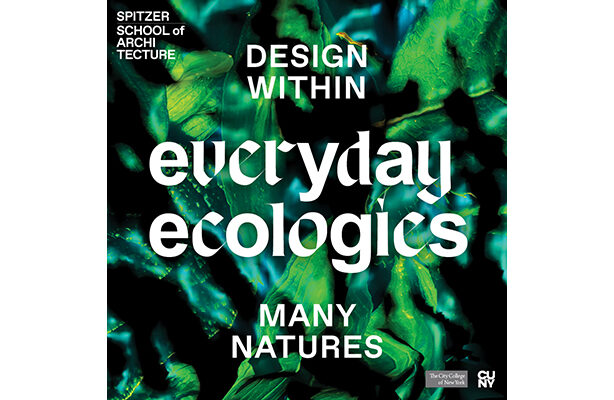Events
Everyday Ecologies: Lecture 2
Panelists: Kate Orff, Elizabeth Hénaff, Andrea Parker, Erika Svendsen, Moderator: Thaisa Way
Thursday, Oct 29, 2020
6:00 pm - 8:00 pm
Online - Zoom meeting
Free and open to the public - Please register for this Zoom event here.
The future of the human species is bound up in how we design, plan, and live within emergent extremes in global ecosystems. Paralysis in the face of contentious issues, uncritical acceptance of traditional roles, sectors, and hierarchies, and unquestioned long-held truths inhibit development of new ideas and approaches to design effectively. To instigate new approaches, we have invited designers, planners, historians, and social scientists to talk about Everyday Ecosystems: the boundless communities we are part of—a cocktail of cultures crossing economic and class strata with overlapping gender, racial, and spiritual identities—that complement but also compete with each other and conflict internally for rights and means to perpetuate their cultural identities, social relations, and environmental resource needs and desires.
Speakers will present a “zombie” idea or theory that one of their projects contests through design, planning, or projective research and analysis. Together, we aim to develop principles that will establish a foothold from which to launch a new approach to design and planning discourse based neither on privileged solutions by experts nor abdication of authorship in lieu of community determinism.
Elizabeth Hénaff is a computational biologist with an art practice and an Assistant Professor in the Technology, Culture and Society department at the NYU Tandon School of Engineering. At the center of her work is a fascination with the way living beings interact with their environment. This inquiry has produced a body of work that ranges from scientific articles in peer-reviewed journals, to projects with landscape architects, to art installations. She has shown work at the 2016 Venice Architecture Biennale, the Storefront for Art and Architecture in NYC, the Detroit Science Gallery and the Okayama Biennial Art Summit. She consistently makes the tools - software, wetware, hardware - needed to answer her research questions.
Kate Orff is a Professor at Columbia GSAPP and Director of the Urban Design Program. Orff is a registered landscape architect and the founder of SCAPE, an award-winning professional practice based in lower Manhattan. The firm has won National and local American Society of Landscape Architecture Awards for built projects, planning and communications work, and the work of the office has been featured on the cover of Landscape Architecture magazine, LA China and Topos, and in The New York Times, New Yorker and Economist. She collaborated with photographer Richard Misrach on the exhibition and book, Petrochemical America (2014). Kate Orff was awarded a 2017 MacArthur Fellowship.
Andrea Parker is Executive Director of Gowanus Canal Conservancy, the chief environmental steward for the Gowanus Canal Watershed. In this role, she has led coordination of community members, partner organizations, elected officials, and agency representatives towards development of the Gowanus Lowlands Master Plan, which leverages multiple ongoing land use and remediation processes to plan for a network of resilient, vibrant and accessible parks and public spaces centered on the Gowanus Canal. She is additionally a lecturer in Ecology in the graduate program in landscape architecture at CCNY, and has a background as a landscape architect and horticultural activist.
Erika Svendsen is a social scientist with the U.S. Forest Service, Northern Research Station. A leader in the field of environmental stewardship as it relates to community development, governance, and human well-being, she is the co-Director of the New York City urban field station, a partnership between the Forest Service, NYC Parks, several NGOs, and academic institutions. The field station is part of a network of cities and agencies promoting research, cultivating ideas, and fostering collaboration among scientists and practitioners. She co-authored How Planting Trees Strengthens the Roots of Democracy (2015) and she received an Early Career Scientist Award recognizing her co-development of STEW-MAP, a tool for assessing and visualizing the contributions of civic stewardship groups.
Thaisa Way is an urban landscape historian at the University of Washington and Program Director of Garden & Landscapes Studies at Dumbarton Oaks Research Library and Collections where she leads a Mellon Urban Humanities Initiative titled "Democracy and the Urban Landscape: Race, Identity, and Difference." Her publications include: Unbounded Practices: Women, Landscape Architecture, and Early Twentieth Century Design (2009, awarded the J.B. Jackson Book Award in 2012), From Modern Space to Urban Ecological Design: the Landscape Architecture of Richard Haag (2015) and GGN 1999-2018 (2018). She has edited two books in urban environmental history and practice: Now Urbanism with Jeff Hou, Ken Yocom, and Ben Spencer (2013), and River Cities/City Rivers (2018).
Export as:


